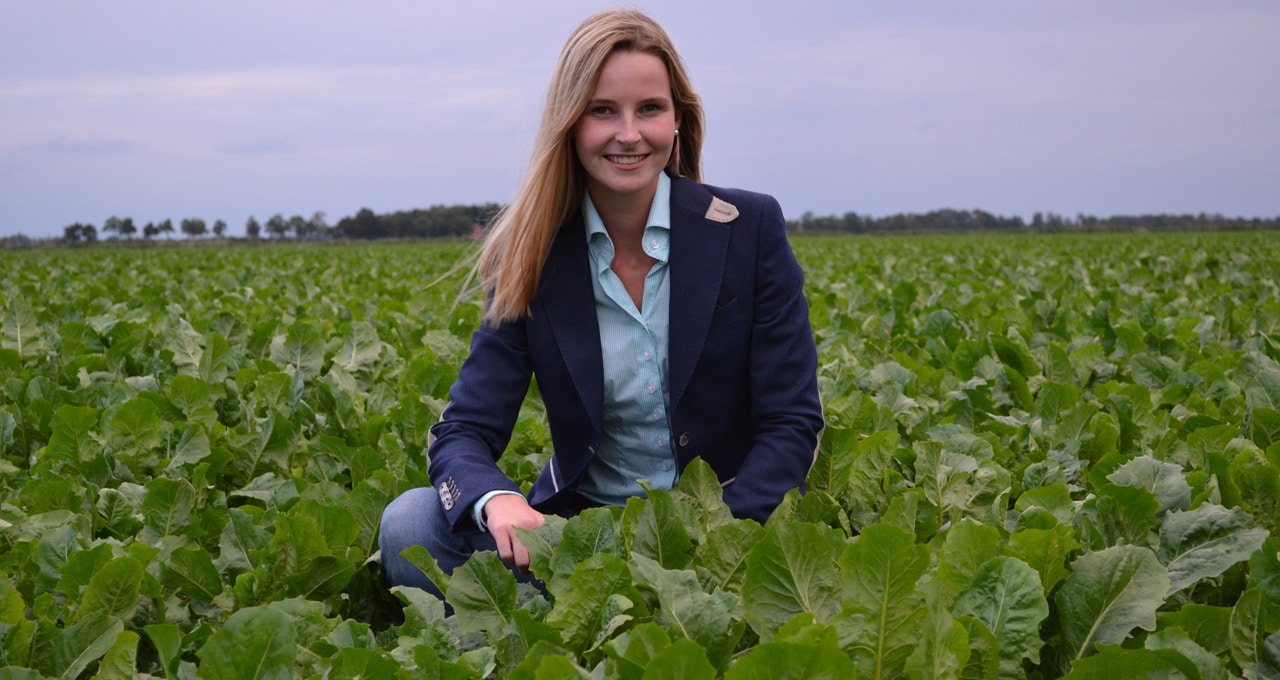The young farmers rising to tomorrow’s challenges Next generation farming What happens to our food system if the next generation doesn’t take up farming? Iris Bouwers, Vice Chair of the European Council of Young Farmers, describes the challenges young farmers face and how the government, banks and consumers can help.
Next generation farming
At the age of 18, Iris Bouwers had no intention of taking over her parents’ mixed farm. She didn’t see herself growing six different crops and raising pigs. Now, at 25, with a degree in Agribusiness in the pocket, she’s an official partner in the family firm that she will one day own. “I’m still not a hundred percent sure about becoming a farmer,” she admits. “Do I have what it takes to be a farmer in tomorrow’s market?”
Daunting
Indeed, the prospect is quite daunting for her and other young would-be farmers. At its current size, the farm is already worth millions, but more investment is needed to expand and innovate if it is to keep up with the global competition. Land is in short supply and prices have skyrocketed. Meanwhile, issues like animal welfare, biodiversity and carbon emissions have placed farmers under intense public scrutiny and prompted the government to tighten regulations. Moreover, farming is fast becoming a high-tech profession, but without the status and income that ‘techies’ can command elsewhere.
“Do I have what it takes to be a farmer in tomorrow’s market?” – Iris Bouwers, European Council of Young Farmers
It’s not surprising, therefore, that currently only 5.6 percent of European farmers, and a mere 3.9 percent of Dutch farmers, are under 35. “We risk ending up with a handful of colossal farms. I’m worried about what that might mean for the quality of life,” says Bouwers. “We need to engage more young people to turn the tide.”
Successor support
Luckily, successors can count on a certain measure of support. The government offers tax breaks and subsidies. Universities and colleges provide their students with the latest scientific and business insights. “And I can always consult my account manager at Rabobank,” says Iris. “The bank also organizes special courses as well as individual and family coaching. I can likely take over my parents’ loan, too, but I do have to present a sound business plan. Banks are subject to new, stricter rules when it comes to long-term profitability.”
Going green
Iris and other young farmers will also need to take the transition to sustainable agriculture in their stride. That does not worry her, however. “Agriculture has always been in transition, so that’s nothing new. The focus has long been on upscaling, but in the Netherlands space and land prices are becoming an issue. A number of farmers will be able to keep growing and competing globally. But for individual farmers, the transition to sustainable farming is going to be a matter of careful timing.”
“We need to engage more young people to turn the tide” – Iris Bouwers, European Council of Young Farmers
She recalls how in 2000, her parents invested millions of borrowed money in a new pig shed meeting the criteria for a one-star ‘Better Life’ designation. But in the end, consumers were not prepared to pay a higher price for improved animal welfare. A handful of conscious consumers preferred organic meat, and the vast majority stuck to the cheaper, traditional alternative. “What that fiasco taught me is that it’s extremely risky to run ahead of the market. You have to wait for demand to materialize before you make your move.”
Backfire
The Dutch government and the EU are legislating towards a more circular agricultural sector. They could decide to ban non-sustainable practices and reduce livestock headcount. Iris is not in favor of that. “I think overly strict legislation would backfire. Production would simply shift to other countries, where regulatory pressure is lower and farms are less innovative than here. Globally, that would actually increase carbon emissions. A better idea would be to ensure farmers here are rewarded for environmentally friendly practices.”
The alternative would be to slap taxes on environmentally unfriendly products like meat. Bouwers bristles at this. “Do we really want to deny consumers the food they’re used to? I’d rather encourage people to make a positive choice for quality. They can reward farmers, too, by paying a better price.”
Harmony
In 25 years, Bouwers hopes to be part of a proud agricultural sector, sustainably feeding the world, in harmony with nature and with the support of the community. “We’re already working hard to get there. Our farm borders on a nature reserve. If I have my way, both will still be in place, side by side, for many years to come.”
Listen to the full podcast now (in Dutch only), via our podcast channel or iTunes, or search “Food Forward” in your favorite iPhone or Android app.
At F&A Next 2019, May 15-16, Iris Bouwers is presenting a key note lecture on “EU agricultural policy and embracing new technologies.” This premier F&A innovation event in the Netherlands connects innovative food and agriculture start-ups with investors. Register today!
